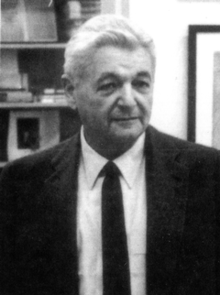Jerrold R. Zacharias
Jerrold Reinach Zacharias | |
|---|---|
 | |
| Born | January 23, 1905 |
| Died | July 16, 1986 (aged 81) |
| Nationality | American |
| Awards | Oersted Medal (1961) |
| Scientific career | |
| Fields | Physics |
| Institutions | Massachusetts Institute of Technology |
| Doctoral students | John G. King |
Jerrold Reinach Zacharias (January 23, 1905–July 16, 1986) was an American physicist and Institute Professor at the Massachusetts Institute of Technology,[1] as well as an education reformer. His scientific work was in the area of nuclear physics.
Biography
Jerrold Zacharias was born on January 23, 1905 in Jacksonville, Florida.
Zacharias was involved in both the Radiation Laboratory at MIT and the Manhattan Project. He helped build the MIT physics department after the war, and was responsible for recruiting Bruno Rossi and Victor Weisskopf to the Institute. During the Cold War he was the head of a number of defense-related studies hosted at MIT (Project Hartwell, Project Charles, Project Lamp Light) and later he both founded and ran the Physical Science Study Committee, which was influential in changing physics education in the United States in the wake of Sputnik (1957).
Zacharias also developed the first practical version of the cesium-beam clock,[citation needed] often called an "atomic clock," which later became the internationally accepted standard for timekeeping.
In 1954 he testified at the security clearance hearing of J. Robert Oppenheimer, where he was accused of being part of a cabal known as "ZORC" (Zacharias, Oppenheimer, Rabi, Charles Lauritsen) that was attempting to do damage to U.S. national security. (On the contrary, Zacharias did much research to aid national defense.)[citation needed] He was later investigated by agents of Senator Joseph McCarthy. He did not cooperate with them and consequently there was fear that he might lose his job.
He was awarded the Oersted Medal in 1961.
During the Lyndon B. Johnson administration, Zacharias worked for the White House's Office of Science and Technology. In the mid 1960s he hosted a series of lectures at Tufts University which acted as the spark for the formation of the pioneering artists-in-the-schools organization Teachers & Writers Collaborative.[2] Zacharias continued to push for educational reform throughout the 1960s and 1970s through such projects as Elementary Science Study and the educational TV series Infinity Factory. He was also the founder of Education Development Center, a global nonprofit that develops science and math curricula.
Zacharias died at age 81.
See also
References
Notes
- ^ Feshbach, Herman; French, Anthony P.; Hill, Albert G.; King, John G. (July 1987). "Obituary: Jerrold Reinach Zacharias". Physics Today. 40 (7): 85–86. Bibcode:1987PhT....40g..85F. doi:10.1063/1.2820125.
{{cite journal}}: CS1 maint: multiple names: authors list (link) - ^ Hechinger, Fred M. "About Education: An Experiment in 'Activism,'" New York Times (Dec. 4, 1979).
Sources consulted
- Norman F. Ramsey. "Jerrold R. Zacharias (1905-1986)" (PDF). National Academy of Sciences website. Retrieved 2014-05-30.
- Jack S. Goldstein (1992), A Different Sort of Time: The Life of Jerrold R. Zacharias, MIT Press
